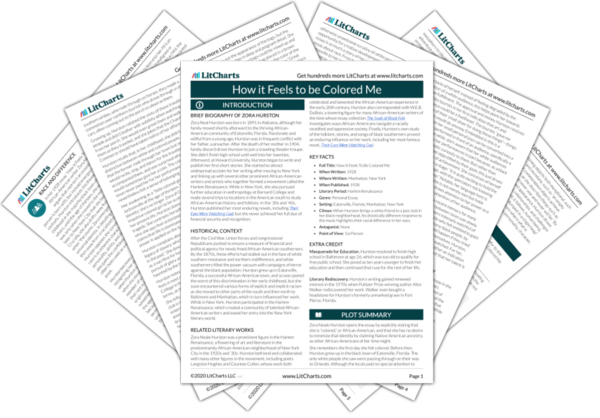When Zora Neale Hurston wrote this essay in the 1920s, the United States was only 60 years removed from the Civil War, making the end of slavery well within living memory. As such, any account of the African-American experience would have to reckon with that legacy. Hurston does this in a uniquely idiosyncratic way. While acknowledging the persistence of racial discrimination, she minimizes the impact of slavery on the current circumstances of African-Americans. Instead, she places herself at a pivotal time in history: after the end of slavery, but long before the arrival of anything resembling racial equality. Because the status of black Americans in a white-dominated country is the subject of national attention, Hurston has the most power to make her mark on what form these social relationships will take.
Hurston feels emboldened by the basic rights African-Americans had gained by the 1920s rather than dispirited by the true equality yet to be won. For her, the distance still to be traveled represents an opportunity. She uses a series of heroic metaphors to situate her own time as an epoch of high adventure and glorious struggle, with herself as a primary protagonist. What’s more, playing offense on social justice is a much more heroic challenge than playing defense. As she writes, “The game of keeping what one has is never so exciting as the game of getting.” The former is a cheerless and doomed task, while the latter, however arduous, is thrilling. Even the fact of white racism heightens the sense of heroism. Hurston points out that white Americans tend to view individual African-Americans as perfect representatives of a larger racial group, but she sees this as an opportunity rather than a burden: “It is thrilling to think—to know that for any act of mine, I shall get twice as much praise or twice as much blame.”
For her “white neighbor,” the story is different—in part because of white people’s slowly diminishing societal power, but primarily because of well-deserved guilt. Hurston contends that the legacy of slavery hangs more heavily on white than black Americans. She has all the optimism and verve of a clean conscience, busy as she is “sharpening [her] oyster knife,” and her vows to get the most out of life sparkle with words like “adventure” and “glory.” White Americans, however, have to grapple with “brown specters” and “dark ghosts” that speak to the deepening guilt of hundreds of years of brutal slavery. Crucially, while Hurston seeks adventure and the stage, the white neighbor is interrupted by his ghosts while going about dour, domestic tasks. When these ghosts make a trial out of eating or sleeping, the kind of high drama that Hurston seeks seems unthinkable.
Hurston’s dismissal of slavery’s influence on her life seems premature to modern readers, especially in an essay written 40 years before the Civil Rights movement. But her refusal to “look behind and weep” plays to her strategic benefit as an artist coming into her own. She can place herself at the vanguard of a changing America with considerable freedom to accelerate and shape that change. Furthermore, she creates a sense that African-American history is new and vital, while the history of white America is heavy with the sins of the distant and recent past. This is a framing of racial history that expands her freedom to define herself as both an artist and a person.
History and Opportunity ThemeTracker

History and Opportunity Quotes in How it Feels to be Colored Me
I do not belong to the sobbing school of Negrohood who hold that nature somehow has given them a lowdown dirty deal and whose feelings are all but about it. Even in the helter-skelter skirmish that is my life, I have seen that the world is to the strong regardless of a little pigmentation more of less. No, I do not weep at the world—I am too busy sharpening my oyster knife.

Unlock explanations and citation info for this and every other How it Feels to be Colored Me quote.
Plus so much more...
Get LitCharts A+It is a bully adventure and worth all that I have paid through my ancestors for it. No one on earth ever had a greater chance for glory. The world to be won and nothing to be lost. It is thrilling to think—to know that for any act of mine, I shall get twice as much praise or twice as much blame. It is quite exciting to hold the center of the national stage, with the spectators not knowing whether to laugh or to weep.











